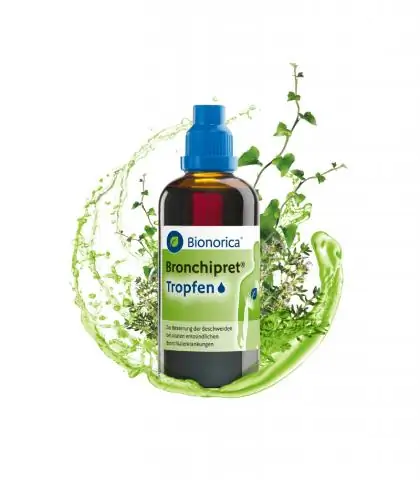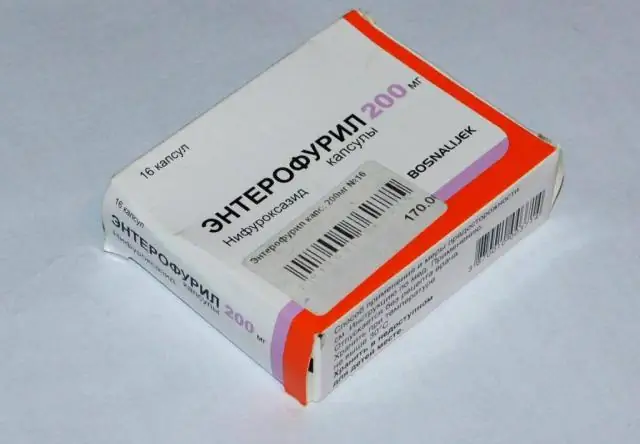- Author Rachel Wainwright wainwright@abchealthonline.com.
- Public 2023-12-15 07:39.
- Last modified 2025-11-02 20:14.
ACC 100
ACTS 100: instructions for use and reviews
- 1. Release form and composition
- 2. Pharmacological properties
- 3. Indications for use
- 4. Contraindications
- 5. Method of application and dosage
- 6. Side effects
- 7. Overdose
- 8. Special instructions
- 9. Application during pregnancy and lactation
- 10. Use in childhood
- 11. In case of impaired renal function
- 12. For violations of liver function
- 13. Drug interactions
- 14. Analogs
- 15. Terms and conditions of storage
- 16. Terms of dispensing from pharmacies
- 17. Reviews
- 18. Price in pharmacies
Latin name: ACC 100
ATX code: R05CB01
Active ingredient: acetylcysteine (acetylcysteine)
Manufacturer: Hermes Pharma (Austria), Salutas Pharma GmbH (Germany)
Description and photo updated: 22.11.2018
Prices in pharmacies: from 99 rubles.
Buy

ACTS 100 is an expectorant mucolytic agent.
Release form and composition
Dosage form ACTS 100 - effervescent tablets: round, flat-cylindrical, white, with a blackberry aroma, there may be a slight sulfur odor (4 pcs. In strips, in a cardboard box 15 strips; 20 pcs. In plastic tubes, in a cardboard box 1 tube; 25 pcs. in plastic tubes, in a cardboard box 2 or 4 tubes).
Composition of one tablet:
- active substance: acetylcysteine - 100 mg;
- auxiliary components: sodium bicarbonate, ascorbic acid, anhydrous citric acid, sodium saccharinate, sodium carbonate anhydrous, sodium citrate, mannitol, anhydrous lactose, blackberry flavor "B".
Pharmacological properties
Pharmacodynamics
Acetylcysteine is a derivative of the amino acid cysteine. The effect of the drug is explained by its ability to break the disulfide bonds of mucopolysaccharide chains and cause depolymerization of mucoproteins in sputum, as a result of which the viscosity of sputum decreases.
Acetylcysteine has a mucolytic effect: due to a direct effect on the rheological properties of sputum, it facilitates its discharge.
Due to the ability of the reactive sulfhydryl group (SH-group) of acetylcysteine to bind to oxidative radicals and neutralize them, the drug has antioxidant properties. Thus, it increases the protection of cells against the damaging effects of free radical oxidation inherent in an intense inflammatory response.
In addition, acetylcysteine improves the synthesis of glutathione, which is an important component of the body's chemical detoxification and antioxidant system.
With prophylactic use, the drug reduces the frequency and severity of exacerbations of chronic bronchitis and cystic fibrosis.
Pharmacokinetics
After taking ACC 100 inside, acetylcysteine is rapidly absorbed; metabolized in the liver to form cysteine (active metabolite), cystine, diacetylcysteine and mixed disulfides. Due to the pronounced effect of the first passage through the liver, it is characterized by low bioavailability - about 10%.
The maximum concentration in the blood reaches within 1-3 hours. It binds to blood plasma proteins by about 50%.
It is excreted by the kidneys in the form of inactive metabolites (diacetylcysteine and inorganic sulfates). The half-life is about 1 hour, with impaired hepatic function, the elimination time increases to 8 hours.
Acetylcysteine crosses the placental barrier. There is no information about the ability of the drug to penetrate the blood-brain barrier and into breast milk.
Indications for use
According to the instructions, ACC 100 is intended for the treatment of respiratory diseases, accompanied by the formation of viscous, difficult to separate sputum, such as:
- tracheitis;
- laryngotracheitis;
- bronchitis (acute and chronic);
- obstructive bronchitis;
- chronic obstructive pulmonary disease;
- bronchial asthma;
- bronchiolitis;
- bronchiectasis;
- pneumonia;
- lung abscess;
- cystic fibrosis.
Also ACC 100 is used for otitis media (otitis media), acute and chronic sinusitis.
Contraindications
- peptic ulcer of the stomach and duodenum in the acute stage;
- lactose intolerance, lactase deficiency, glucose-galactose malabsorption;
- hemoptysis, pulmonary bleeding;
- the period of pregnancy and breastfeeding;
- hypersensitivity to any component of the drug.
Age limit: ACTS 100 should not be used for children under 2 years of age.
With care: obstructive bronchitis, bronchial asthma, arterial hypertension, adrenal diseases, history of gastric ulcer and duodenal ulcer, esophageal varices, renal and / or hepatic insufficiency, histamine intolerance.
Instructions for the use of ACTS 100: method and dosage
ACC 100 should be taken orally, after meals. Immediately before taking the tablets, dissolve in 1 glass of water, in exceptional cases, the solution can be stored for no more than 2 hours.
To enhance the mucolytic effect allows additional fluid intake.
For short-term colds, the drug is indicated to be taken for 5-7 days. With cystic fibrosis and chronic bronchitis, longer treatment is required to achieve a preventive effect.
Unless instructed otherwise by your doctor, it is recommended that you adhere to the guidelines below.
Mucolytic therapy:
- adults and adolescents from 14 years old: 2 pcs. 2-3 times a day;
- children 6-14 years old: 1 pc. 3 times a day or 2 pcs. 2 times a day;
- children 2-6 years old: 1 pc. 2-3 times a day.
Treatment for cystic fibrosis:
- children from 6 years old: 2 pcs. 3 times a day;
- children 2-6 years old: 1 pc. 4 times a day.
Side effects
- from the respiratory system: rarely (from> 1/10000 to <1/1000) - shortness of breath, bronchospasm (mainly in bronchial asthma in patients with bronchial hyperreactivity);
- allergic reactions: infrequently (from> 1/1000 to <1/100) - skin rashes, itching, urticaria, exanthema, angioedema, tachycardia, decreased blood pressure; very rarely (<1/10000) - anaphylactic reactions up to anaphylactic shock, toxic epidermal necrolysis, Stevens-Johnson syndrome;
- from the gastrointestinal tract: infrequently - stomatitis, heartburn, diarrhea, nausea, abdominal pain, dyspepsia, vomiting;
- from the senses: infrequently - tinnitus;
- other: infrequently - fever, headache; the frequency is unknown - bleeding due to the development of hypersensitivity reactions, a decrease in platelet aggregation.
Overdose
Symptoms: stomach pain, diarrhea, heartburn, nausea, vomiting.
Treatment is symptomatic.
special instructions
Patients with diabetes should take into account that each tablet corresponds to 0.006 XE.
It is recommended to use glassware when preparing the solution. Avoid contact of the solution with oxygen, rubber, metals and easily oxidizing substances.
An evening dose of the drug must be taken no later than 18.00.
In bronchial asthma and obstructive bronchitis, ACC 100 should be used with caution, under systemic control of bronchial conduction.
There are rare cases of severe allergic reactions, such as toxic epidermal necrolysis and Stevens-Johnson syndrome. If the patient notices changes on the skin or mucous membranes, it is necessary to stop taking ACC 100 and immediately consult a doctor.
Acetylcysteine affects the metabolism of histamine, therefore, it can cause signs of intolerance (vasomotor rhinitis, headache, itching), and therefore it is recommended to avoid long-term intake of ACC 100.
Influence on the ability to drive vehicles and complex mechanisms
When used in recommended doses, ACC 100 does not adversely affect the reaction rate and human attention.
Application during pregnancy and lactation
There is insufficient data on the use of the drug during pregnancy and breastfeeding to assess the degree of its safety, therefore ACC 100 is contraindicated in pregnant women. It is recommended that breastfeeding be discontinued if treatment is required during lactation.
Pediatric use
The use of ACC 100 for children under 2 years of age is prohibited.
With impaired renal function
In renal failure, ACC 100 should be used with caution.
For violations of liver function
In liver failure, ACC 100 should be used with caution.
Drug interactions
Antitussives should not be used simultaneously with acetylcysteine, since they suppress the cough reflex and promote sputum stagnation.
Acetylcysteine can reduce the effect of oral antibiotics (tetracyclines, penicillins, cephalosporins, etc.), therefore, intervals of at least 2 hours should be observed between their doses (with the exception of cefixime and loracarben).
With the simultaneous use of nitroglycerin or vasodilating agents, it is possible to enhance the vasodilating effect.
Analogs
Analogs of ACC 100 are the drugs Acestine, Acetylcysteine, Acetylcysteine-Teva, Acetylcysteine Canon, N-AC-ratiopharm, ESPA-NAC, Fluimucil, ACTS, ACTS Long, ACTS inject, ACTS 200.
Terms and conditions of storage
The shelf life is 3 years.
Store in tightly closed containers at temperatures up to 25 ° C in a dry place out of reach of children.
Terms of dispensing from pharmacies
Available without a prescription.
Reviews about ACC 100
Given the low dosage, the drug is most often used to treat children. Parents leave mostly positive reviews about ACC 100: the drug effectively liquefies phlegm and promotes its excretion, acts quickly (improvement is noted already on the 2-3rd day of admission), and has a pleasant taste.
The only disadvantage is the relatively high cost.
Price for ACC 100 in pharmacies
The approximate price for ACC 100 is 227-247 rubles for a pack of 20 effervescent tablets.
ACC 100: prices in online pharmacies
|
Drug name Price Pharmacy |
|
ACC 100 mg granules for oral solution with orange flavor or aroma 3 g 20 pcs. RUB 99 Buy |
|
ACTS 100 100 mg effervescent tablets 20 pcs. 222 r Buy |
|
Azz 100 tablets thorn. 100mg 20 pcs. 234 r Buy |

Anna Kozlova Medical journalist About the author
Education: Rostov State Medical University, specialty "General Medicine".
Information about the drug is generalized, provided for informational purposes only and does not replace the official instructions. Self-medication is hazardous to health!






